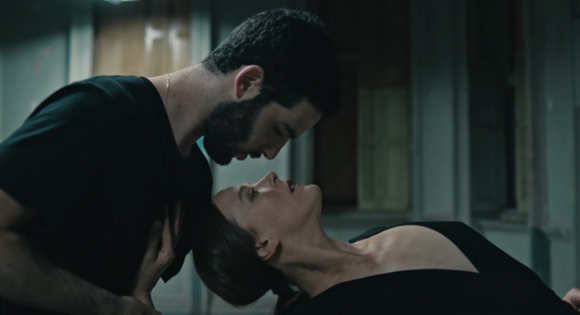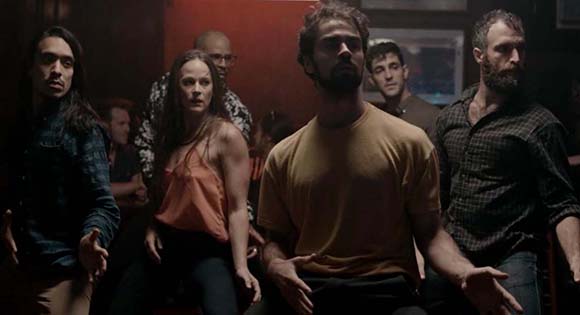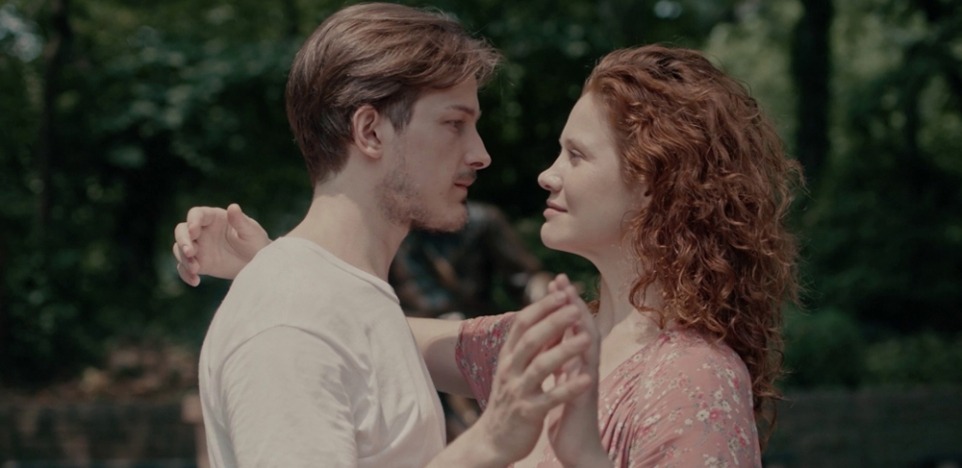Any attempt to describe the mesmerizing magic of Boaz Yakin’s strange and hypnotic latest feature, Aviva, will fall short or fall flat. Its quirks will definitely not be to all tastes and its nonlinear, sometimes nonsensical look at the complications of modern love often feels simultaneously simplistic and inscrutable. But there is something deliciously daring about this dance-driven exploration of the spectrum between the masculine and the feminine, and Aviva’s brazen queering of traditional binaries leaves a lasting impression that transcends its clunkier clichés.
The premise, such as it is, is straightforward: Eden (Tyler Phillips), lonely in New York City, and Aviva (Zina Zinchenko), eager in Paris, strike up an amorous transoceanic correspondence. From there, following a thrillingly choreographed and scored opening duet, the couple decide to meet on Eden’s side and begin a years-long relationship filled with ups, downs, highs, lows, breakups, makeups, and everything in between. If this were all that Aviva had to offer, it might be entirely forgettable.

But Aviva’s true innovation lies in the details and the dancing. As for the details, Yakin makes a bold choice in adding two more actors to the mix, Bobbi Jene Smith and Or Schraiber (who also are the co-choreographers). Smith and Schraiber don’t play additional characters; they play the feminine and masculine sides of Eden and Aviva. Though this unconventional, binary-questioning conceit might sound clumsy and confusing, it’s actually quite effective, especially as the multiple personalities push and pull in the bedroom and on the dance floor, each vying for the upper hand as the relationship ebbs and flows and communication crumbles.
As for the dancing, it’s consistently absorbing, especially as all members of the foursome share more and more screen time as the film proceeds. New romantic partners enter the picture and nosy friends join the fun as flirty group numbers are juxtaposed with more intimate pas de deuxs. The dance numbers feel less like the typical heightened conventions of a musical and more like messages from another dimension threatening to take over any sense of realism and run off with the plot. Eventually, the two parts of each half of the couple blend and merge. Reality gives way to confounding fantasy that progressively dissolves into cryptic, disorienting fragments that feel as frustratingly surreal as any true-to-life relationship drama.
Some will not be charmed by Aviva’s overstuffed flights of fancy, but Yakin doesn’t seem at all interested in subtlety. Aviva’s world thrives on excess of all kinds: emotion, artistry, and an unflinching adoration of all kinds of bodies and the way they move, together and apart. In fact, most everyone ends up fully nude at some point, sex is shown in all of its awkward glory, and every character shows numerous faces, many of them anxious and unattractive. It’s a strange mix of gorgeous dance and not-so-pretty behavior, and any viewer’s stamina will be tested by the increasingly unhealthy back-and-forth in which Eden, Aviva, their daemon other halves, and their other friends and lovers constantly engage.

Ultimately, Aviva never settles into claiming what it truly wants to be. It’s both overly complicated and undercooked, packed with affectingly performed movement and strangely stilted dialogue, it might have benefitted from taking its queerer aspects even further, and its focus on the push-me-pull-you of its leads’ masculine and feminine sides never cohere into a solid takeaway message. Many will think these aspects signs of failure, but all of Aviva’s loose threads actually end up feeling like the woozy, inarticulate, flailing experience of falling in, out, in, out, in, and out of love again. It’s a singular experience that lingers like a dream that refuses to be analyzed, a potentially prophetic view into a truth too deep to ever be fully understood.
